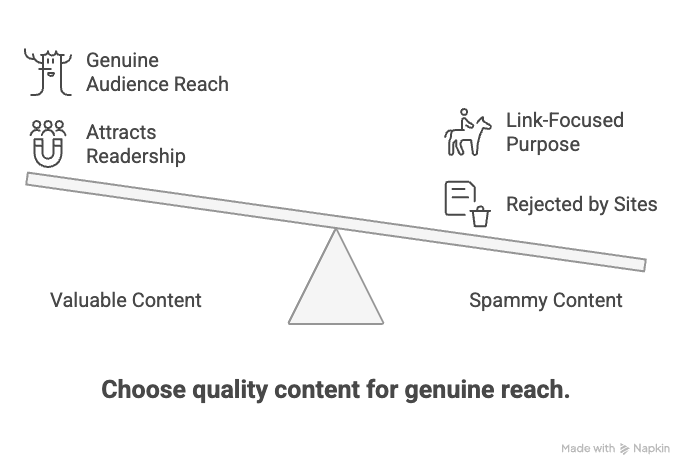In an uncharacteristically forthright blog post, Matt Cutts, head honcho of Google’s webspam team, lashed out at the practice of guest blogging. Apparently infuriated by what is probably the millionth automated spam email from low-grade online marketers offering to produce content for his blog, Cutts seems ready to go to war with guest bloggers.
“Okay, I’m calling it: if you’re using guest blogging as a way to gain links in 2014, you should probably stop. Why? Because over time it’s become a more and more spammy practice, and if you’re doing a lot of guest blogging then you’re hanging out with really bad company.”
If you haven’t already, you should check out the post to understand the nuance of his position. Of course, a backlash is already well underway, with many apparently having missed that nuance.
Content Quality!
To clarify further, a moment’s thought reveals this distinction. Specifically, if we understand guest posting in the way that experts do, then Cutts clearly can’t mean it’s a bad thing. Conversely, if we view it narrowly as simply creating poor content solely to gain links, then this approach is not new. Indeed, doing that has always been a foolish strategy. Furthermore, a close reading of Cutts’ blog post actually shows that he is emphasizing this second, narrow interpretation.
“Ultimately, this is why we can’t have nice things in the SEO space: a trend starts out as authentic. Then more and more people pile on until only the barest trace of legitimate behavior remains.”
Many online marketers misunderstand guest posting. They see it as a link-building tactic. They want it to replace ineffective comment and forum spam. Aiming to automate finding guest post opportunities. They want to create sites full of spammy content. This content exists only for embedded links. They want to generate cheap, worthless junk content. This content interests no one.

Why Content is King!
Content is the Internet. Everything else just helps people access content. Content needs creators. It also needs a place to be published. It needs to reach people. Imagine a world of only individual or company sites. People would only publish their own content. This is unthinkable. It goes against the web’s community spirit. It also opposes its interconnected nature. So, sites beyond authors’ direct links will share content. There’s nothing wrong with putting content on different sites, including blog content.
However, that content must have its own value. It can’t simply be a vehicle for a link; in other words, that’s putting the cart before the horse. Therefore, if a company creates valuable content that naturally attracts a readership, it’s entirely legitimate to offer that content to trusted, authoritative sites within the relevant niche. The reason for this is clear: it helps the content reach the widest possible audience. Furthermore, reputable sites would not accept content with obviously spammy keyword anchor text links.. They also don’t take low-quality content. That’s how they became trusted in the first place.
So Why Guest Blog If It’s Not For The Links?
You should regard the link-building part of guest blogging as a helpful side-effect. It shouldn’t be your only reason for doing it. Guest blogging is a powerful marketing technique for many reasons:
It generates exposure and a wider audience for a brand.
Establishes the expertise and reputation of a company or individual.
It helps build relationships with others in the same niche.
It provides potential customers with something of value.
A link-obsessed approach weakens all these reasons for guest blogging. So, Cutts is right, even if his words were strong. (He later softened them with an edit).
Guest blogging just for links is spam. It ignores content quality and audience value. Creating great content to share with niche sites is positive. It’s a helpful marketing approach. This benefits guest bloggers and the wider online world.




